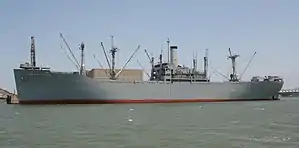SS Clarksdale Victory
The SS Clarksdale Victory was the 80th Victory ship built during World War II. She was launched by the California Shipbuilding Company on January 27, 1945, and completed on February 26, 1945. The ship’s United States Maritime Commission designation was VC2-S-AP3, hull number 80. She was built in just 86 days under the Emergency Shipbuilding program. SS Clarksdale Victory served in the Pacific Ocean during WW2. SS Clarksdale Victory was 80th of the new 10,500-ton class ship known as Victory ships. Victory ships were designed to replace the earlier Liberty Ships. Liberty ships were designed to be used just for WW2. Victory ships were designed to last longer and serve the US Navy after the war. The Victory ship differed from a Liberty ship in that they were: faster, longer and wider, taller, a thinner stack set farther toward the superstructure and had a long raised forecastle.[2]
 Typical Victory Ship. | |
| History | |
|---|---|
| Name | SS Clarksdale Victory |
| Namesake | Clarksdale, Mississippi |
| Owner | War Shipping Administration |
| Operator | American President Lines |
| Builder | California Shipbuilding Company, Los Angeles |
| Laid down | December 2, 1944 |
| Launched | January 27, 1945 |
| Completed | February 26, 1945 |
| Fate | Sank 1947 off the coast of British Columbia |
| General characteristics | |
| Class and type | VC2-S-AP3 Victory ship |
| Tonnage | 7612 GRT, 4,553 NRT |
| Displacement | 15,200 tons |
| Length | 455 ft (139 m) |
| Beam | 62 ft (19 m) |
| Draught | 28 ft (8.5 m) |
| Installed power | 8,500 shp (6,300 kW) |
| Propulsion | HP & LP turbines geared to a single 20.5-foot (6.2 m) propeller |
| Speed | 16.5 knots |
| Boats & landing craft carried | 4 Lifeboats |
| Complement | 62 Merchant Marine and 28 US Naval Armed Guards |
| Armament | |
| Notes | [1] |
World War II
During World War II the Clarksdale Victory was a cargo supply ship. She took supplies to support the troops at the Battle of Okinawa. She was at Okinawa from April 26 to May 8, 1945. On April 27, 1945 a shell landed only 15 yards from the Clarksdale Victory. The shell exploded and fragments landed on her deck. One of Clarksdale Victory's lifeboats was damaged by the fragments. On the same day near by, the SS Canada Victory was hit by a kamikaze plane; the explosion in a cargo hold blew out the side of the ship, and she sank in seven minutes.[3][4]
After the War
After the war, in January of 1946 she came alongside the USS Taluga (AO-62) at Yokohama, Japan, and unloaded 220 barrels of diesel oil.[5][6]
USAT Clarksdale Victory was in US Army Transport service when ran aground and was wrecked on the British Columbia, Canada coastline off Hippa Reef Island, near Graham Island on November 24, 1947. Clarksdale Victory lost 49 of her 53 crew that day.[7] She was en route from Whittier, Alaska to Seattle. She broke in two due to 50-foot waves pounding her into the rocks; she sank quickly. The SS Denali was sent out in a rescue effort, but due to the high waves had to call off the rescue. The Coast Guard cutters USCGC Wachusett and USCGC Citrus rescued four survivors and the bodies of three of the victims.[8][9][10][11][12] [13][14][15][16]
Honors
Crew of Naval Armed Guard on the SS Clarksdale Victory' earned "Battle Stars" in World War II for war action during the assault occupation of Okinawa from 26 April 1945 to 8 May 1945.[17]
References
- Babcock & Wilcox (April 1944). "Victory Ships". Marine Engineering and Shipping Review.
- shipbuildinghistory.com, Victory Ships list
- US Navy, Action at Okinawa
- USMM, Battle of Okinawa
- USS.Taluga.AO-62, History: from Ships' Log
- historicimages.com, Clarksdale Victory post card
- "USAT Clarksdale Victory (+1947)". Wrecksite. Retrieved 14 May 2022.
- Heaton, K E (8 July 2004). "Shipwrecks in British Columbia's Waters". Archived from the original on 23 March 2012. Retrieved 21 April 2011.
- K.E. Heaton, "Shipwrecks in British Columbia’s Waters", Harlow Marine, July 8, 2004 Archived March 23, 2012, at the Wayback Machine
- World Ship Society
- wrecksite, Clarksdale Victory
- Write Site map
- Gordon Newell, Maritime Events of 1947, H. W. McCurdy Marine History of the Pacific Northwest. p.549
- Photo of wreck
- Photo of wreck
- Photo of wreck
- usmm.org, "Battle Stars" in World War II.
Sources
- Sawyer, L.A. and W.H. Mitchell. Victory ships and tankers: The history of the ‘Victory’ type cargo ships and of the tankers built in the United States of America during World War II, Cornell Maritime Press, 1974, 0-87033-182-5.
- United States Maritime Commission:
- Victory Cargo Ships